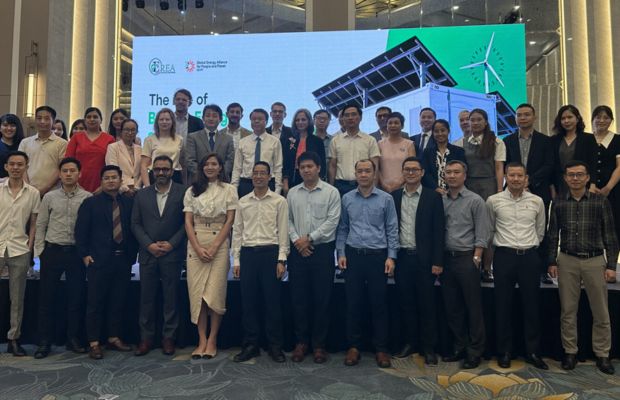The Ministry of Industry and Trade (MOIT)’s Electricity and Renewable Energy Authority (EREA) and the Global Energy Alliance for People and Planet (GEAPP) hosted a technical workshop this month focused on integrating battery energy storage systems (BESS) into Vietnam’s power grid. During the workshop, a report titled “Enhancing Vietnam’s Grid Stability with BESS,” co-authored by the Institute of Energy (IE) and GEAPP, was launched.
Scaling battery energy storage systems is critical in ensuring a steady supply of renewable energy for the communities that need it most. The BESS Consortium―launched by GEAPP in 2023 and of which Vietnam is a member―is on track to meet its target of developing a 5GW pipeline of BESS projects by the end of 2024 and fully deploy 5GW of BESS infrastructure across 30 countries by 2030.
Vietnam’s Power Development Plan VIII (PDPVIII) aims to achieve 300 MW of BESS by 2030. While BESS is relatively new in Vietnam, many countries have already adopted this technology due to its benefits, which include peak shifting, frequency and load management, renewable energy integration, black start capabilities, and transmission deferral. Additionally, the cost of BESS has decreased between 40-50%, making it an attractive option for private and public investors. BESS can play a crucial role in helping Vietnam fulfil the net-zero commitment it made at COP26 and can support sustainable growth and create green jobs in the country while helping avoid the need to increase electricity tariffs for communities and businesses.
Dr. Nguyen Manh Cuong, Acting Director of Power System Development Department at the Institute of Energy – MOIT and Sunita Dubey, GEAPP’s Vietnam Country Representative launched the “Enhancing Vietnam’s Grid Stability with BESS” report during the workshop. The report analyzes how BESS can improve frequency stability in Vietnam’s power system as renewables take a larger portion of the overall energy mix in the country. Dr. Cuong stated: “This study is one of the first steps towards exploring the potential of BESS application in Vietnam’s power system, in which it will play a fundamental role in improving the power supply quality.”
The workshop convened government stakeholders, public and private sector organisations, financial institutions, embassies, and development agencies to share experiences and expertise on BESS. It centred on available technologies, financing mechanisms, policy regulations, and cost issues related to BESS implementation in power systems. Discussions featured speakers from RMI, ADB, GEAPP, and government officials who explored BESS as a pivotal technology for the energy transition. Case studies from India and Mongolia provided insights into global BESS deployment and the importance of its integration of the grid.
Sunita Dubey, GEAPP’s Country Delivery Lead for Vietnam, stated, “Vietnam’s commitment to advancing universal access to clean energy is reinforced through this collective effort. By leveraging technical expertise and mobilising resources, our partners in Vietnam are working to address critical issues such as energy sustainability, economic development, and climate change. This collaboration underscores the vital link between strategic, global alliances and national goals. Together, we are committed to advancing Vietnam’s transition to a net-zero economy.”

